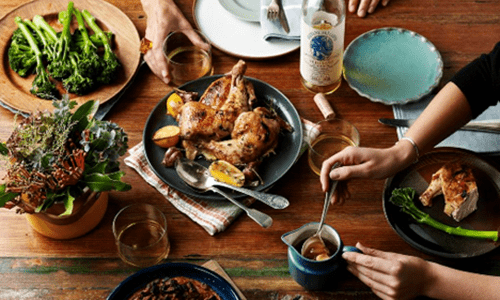 Autumn: “Tis the season of dryness”
Autumn: “Tis the season of dryness”
As the leaves of our deciduous trees are on display in their magnificent yellows, oranges, purples and reds, it’s time to think about autumn, and the changes that autumn brings. Autumn is a season of dryness. It is a time when our immune system is easily overcome, and therefore a time when it is very important to eat well, and protect ourselves from the fresh cold winds that are a sign of the winter to come.
First of all our Yang begins to internalise, triggered by change in the length of the days. Think of trees, and how as the Yang energy of deciduous trees moves inwards nutrients are drawn out of the leaves and down into the roots. The leaves start to dry out and change colour, and then eventually fall off as they are effectively strangled of nutrients.
A similar process occurs at the surface of our body, as our Yang (the heat that emanates from our blood vessels) moves inwards to keep our internal organs warm. This is the reverse of what our Yang was doing in summer when we were frequently emitting heat in an effort to keep our core temperature in check.”Yang” can also translate to “wei” Qi, or defensive energy – our surface immunity.
So in autumn, when there is less Yang at the surface of our body, we are more susceptible to invasion by wind, cold, or other pathogenic forces. We become drier for many reasons: the air is cooler and carries less moisture; the cool dry winds blow any moisture off our surface; and our blood vessels contract and lie deeper inside our bodies. Blood, as a fluid, brings moisture. Fatty tissue contains a lot of fluid, so generally, the leaner our bodies, the more susceptible we are to dryness. Leaner bodies are also more likely to be “blood deficient”, a common diagnosis in Chinese medicine, which further contributes to dryness. While moist, thick skin repels cold well (think about seals, dolphins, thick-skinned surfers, wetsuits), dry bodies can be more easily invaded by cold, and the dryness is often evident in the symptoms we experience, such as lingering dry coughs, or associated dryness of the bowels.
So, to protect ourselves from colds and flus in autumn, we need to cover up from the wind and cold with warm clothes, hoods, scarfs, socks and appropriate footwear. We also need to eat well – warm hearty foods that nourish our blood – and we should not be afraid of laying down a little extra insulation to take us through the winter!
I have included some dietary tips at the end of this article.
This is one of my favourite articles about Chinese Medicine and the immune system.
It is written by one of my teachers, Dr Arnaud Versluys, and the section about fever is well worth a read. Basically, fever is a very good thing, and in fact, the stronger and healthier your immune system is the higher the fever will spike. It is important to keep in mind that by taking medications that lower your fever, you may well be allowing the pathogen to survive, and even to burrow deeper into your body’s defenses.With Chinese medicine, if we can catch your cold/flu at the very onset, we have a lot of potential to “flick it back out”, by stirring up the surface of your body, making you sweat a little, and strengthening your body from the inside-out, so as to prevent your internal organs from being affected. Of course, we can work with a further developed cold too, but for best results, give us a call at the moment you first think “U- oh… I think I might be coming down with something!”
With prompt treatment, chances are you won’t come down with anything at all.For most conditions, but for infectious diseases in particular, I like to follow the classical Chinese Medicine texts. Chinese medicine developed in the age of infectious diseases, so when it comes to colds, flu, viruses, childhood infections, and lingering infections, you could somewhat say we are specialists.
Autumn Diet Advice
It makes sense that the fruit that is currently in season in the climate in which we live will be beneficial at this time. Pears and apples are perfect to moisten our lungs – and particularly beneficial for those with a dry cough. As always though, go easy on the fruit and eat in moderation, especially if you are a “damp” type with low energy, sluggishness, or a wet cough.
Avoid cold foods! For example, cold drinks, summer fruits such as watermelon, bananas, and foods straight from the fridge. It’s even best to avoid too many salads, and opt instead for soups, stews, and other well-cooked, warm foods. Meat stocks (from organic meat) are a fabulously nourishing and incredibly tasty option that will moisten and warm your body from the inside-out.
Chicken soup is super nourishing, and is perhaps one of the best meals you could have if you are feeling a little run down or “under the weather” over the autumn. In particular, I recommend it to people who are otherwise vegetarian. Even if you eat some meat just once each season, or once a month for women (after a period), your health will benefit. Meat broths are extremely nourishing, blood-building, and excellent for your gut health.There is a great recipe on Sarah Wilson’s blog for a roast chicken – the bones and left overs from which can then be used to make a soup. Sarah’s blog is full of excellent diet advice, and this particular recipe comes with a great discussion about why organic chicken is so much better!
Check it out.
Finally, pungent foods such as ginger, onions, garlic, turnips, radishes, and many herbs and spices are ideal when you are feeling vulnerable to illness, or in the early stages of a cold or flu. Well, I hope this has been an enjoyable read.
Please ask me questions, or give me some feedback as it will help with future blog entries. Steph x
P.S. The photo of the Autumn trees was taken between Myrtleford and Bright, along the ‘Murray to Mountains’ Rail Trail. It makes for a really beautiful, and relatively easy-going bike ride, especially in the peak of Autumn– perhaps something to think about for next year!
Check it out at www.murraytomountains.com.au/





